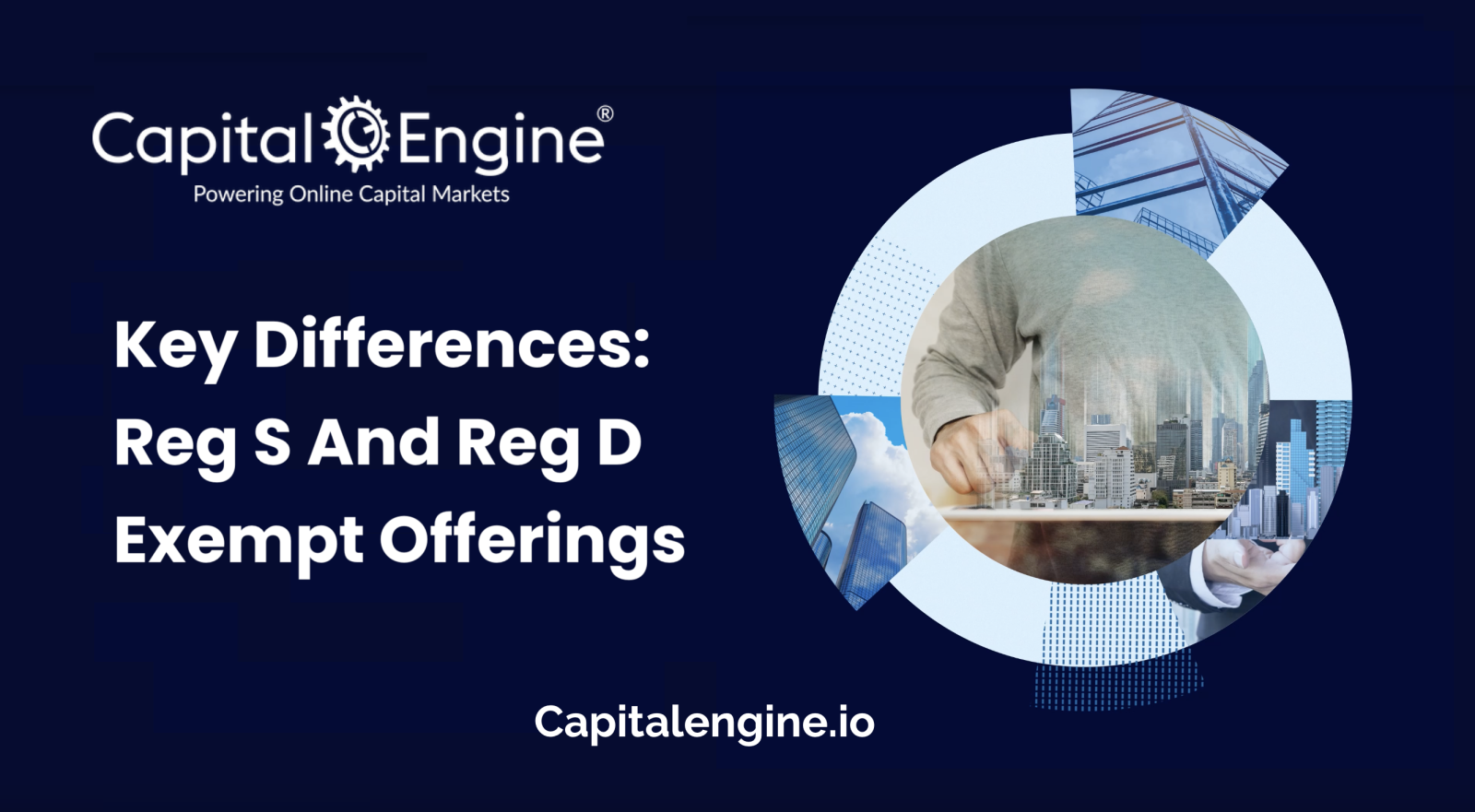Regulatory Exemptions

Key Differences Between Reg S And Reg D Exempt Offerings
Oct 10, 2023
The Basics Of Reg S Offerings
Regulation S is a regulatory framework established by the U.S. Securities and Exchange Commission ("SEC") that governs the offering and sale of securities outside the United States.
Reg S allows companies to raise funds from non-U.S. investors without the need to comply with the stringent registration requirements of the U.S. securities laws.
Reg S offerings are exempt from registration with the SEC if the securities are sold exclusively to non-U.S. persons and no "directed selling efforts" are made within the United States and other applicable requirements are satisfied. This exemption can save significantly in the time and costs otherwise associated with the registration process.
Reg S offerings primarily target non-U.S. investors, ensuring compliance with local securities laws in the jurisdictions where the securities are offered. Companies can tap into a broader international investor base without the restrictions of U.S. securities laws.
Securities sold under Reg S are generally subject to a one-year holding period, during which they cannot be transferred to U.S. persons. This restriction helps maintain compliance with the exemption's intent of offering securities outside the United States.
Understanding Reg D Offerings
Regulation D is a well-known SEC framework that provides various avenues to raise capital from qualified investors in securities offering that are exempt from the SEC'c registration requirements. This streamlines the fundraising process, while still offering so-called "investor protection."
Reg D offerings are generally limited to "accredited investors" who meet specific financial thresholds, such as high net-worth individuals, institutional investors, and certain organizations. This requirement is to ensure that investors have a certain level of financial sophistication and resources; that is, the federal government justifies these rules restricting choice by taking the position that they protect non-wealthy people from making decisions they may later regret.
That said, under certain circumstances, and pursuant to additional regulatory requirements (and their associated costs), in some cases certain qualified non-accredited investors may purchase securities in a Reg D offering.
Key Differences Between Reg S And Reg D Offerings
Reg S focuses on non-U.S. investors, while Reg D primarily targets accredited investors within the United States. This distinction determines the geographical reach and the applicable securities laws.
Reg S offerings occur exclusively outside the United States, while Reg D offerings can take place both domestically and internationally. Reg S offerings have fewer compliance obligations, as they are exempt from the rigorous registration process required under U.S. securities laws.
However, companies must still adhere to the securities laws of the jurisdictions where the securities are offered. In contrast, Reg D offerings have specific requirements to ensure compliance with the regulations and investor protection measures.
Extract from Wojcik Law Firm
About Capital Engine®
Capital Engine® provides forward-thinking organizations with efficient and scalable private capital and investor management solutions, for both traditional and digital assets.
Built for high-performance capital raising, our technology helps leverage the opportunity to better originate and showcase a diverse selection of private investment deals and offer these to investors i.e. a deal’s potential viability can be better assessed, market appetite determined and transaction promptly closed.
Our clients include broker dealers, family offices, wealth managers, incubators, accelerators, social impact and real estate funds, in providing customized SaaS solutions to power private capital and alternative investment platforms, with a strong focus on investor management services.
Interested in raising capital
Request a Call / Demo
Regulation S is a regulatory framework established by the U.S. Securities and Exchange Commission ("SEC") that governs the offering and sale of securities outside the United States.
Reg S allows companies to raise funds from non-U.S. investors without the need to comply with the stringent registration requirements of the U.S. securities laws.
Reg S offerings are exempt from registration with the SEC if the securities are sold exclusively to non-U.S. persons and no "directed selling efforts" are made within the United States and other applicable requirements are satisfied. This exemption can save significantly in the time and costs otherwise associated with the registration process.
Reg S offerings primarily target non-U.S. investors, ensuring compliance with local securities laws in the jurisdictions where the securities are offered. Companies can tap into a broader international investor base without the restrictions of U.S. securities laws.
Securities sold under Reg S are generally subject to a one-year holding period, during which they cannot be transferred to U.S. persons. This restriction helps maintain compliance with the exemption's intent of offering securities outside the United States.
Understanding Reg D Offerings
Regulation D is a well-known SEC framework that provides various avenues to raise capital from qualified investors in securities offering that are exempt from the SEC'c registration requirements. This streamlines the fundraising process, while still offering so-called "investor protection."
Reg D offerings are generally limited to "accredited investors" who meet specific financial thresholds, such as high net-worth individuals, institutional investors, and certain organizations. This requirement is to ensure that investors have a certain level of financial sophistication and resources; that is, the federal government justifies these rules restricting choice by taking the position that they protect non-wealthy people from making decisions they may later regret.
That said, under certain circumstances, and pursuant to additional regulatory requirements (and their associated costs), in some cases certain qualified non-accredited investors may purchase securities in a Reg D offering.
Key Differences Between Reg S And Reg D Offerings
Reg S focuses on non-U.S. investors, while Reg D primarily targets accredited investors within the United States. This distinction determines the geographical reach and the applicable securities laws.
Reg S offerings occur exclusively outside the United States, while Reg D offerings can take place both domestically and internationally. Reg S offerings have fewer compliance obligations, as they are exempt from the rigorous registration process required under U.S. securities laws.
However, companies must still adhere to the securities laws of the jurisdictions where the securities are offered. In contrast, Reg D offerings have specific requirements to ensure compliance with the regulations and investor protection measures.
Extract from Wojcik Law Firm
About Capital Engine®
Capital Engine® provides forward-thinking organizations with efficient and scalable private capital and investor management solutions, for both traditional and digital assets.
Built for high-performance capital raising, our technology helps leverage the opportunity to better originate and showcase a diverse selection of private investment deals and offer these to investors i.e. a deal’s potential viability can be better assessed, market appetite determined and transaction promptly closed.
Our clients include broker dealers, family offices, wealth managers, incubators, accelerators, social impact and real estate funds, in providing customized SaaS solutions to power private capital and alternative investment platforms, with a strong focus on investor management services.
Interested in raising capital
Request a Call / Demo
Latest Articles





